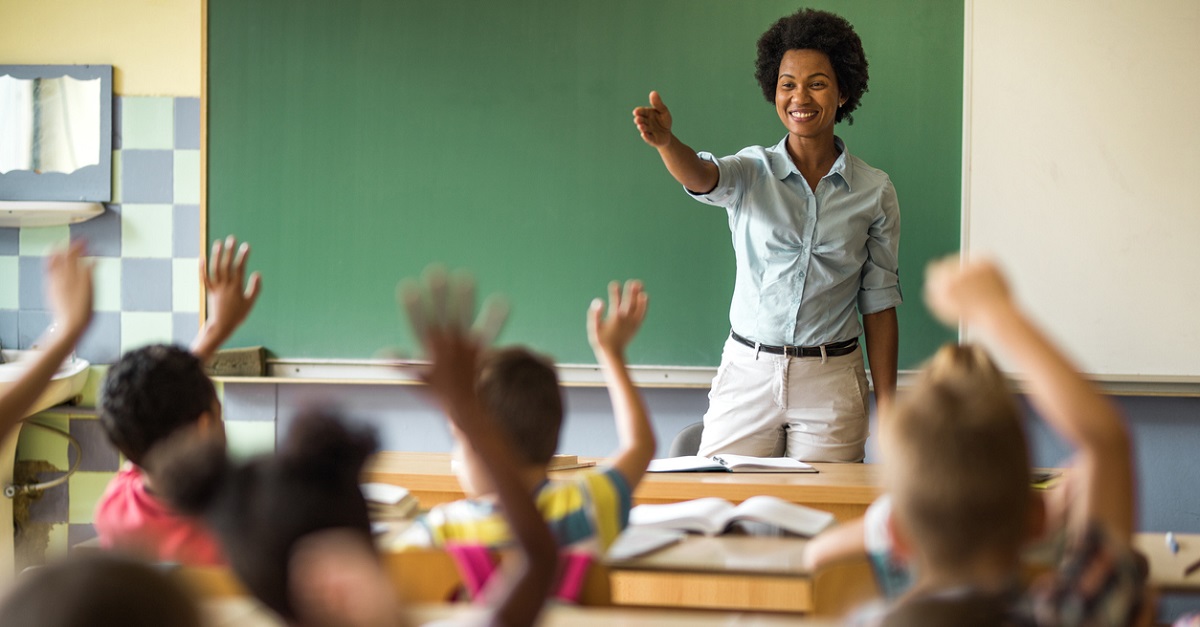
Many teachers have a good idea of the lessons they're going to teach. For those in elementary school, the curriculum often remains the same. Even in high school, history classes typically go over a certain span of time year after year. But after the events that happened at the US Capitol this year, teachers are realizing that it's time to address what's happening today.
A Georgia teacher named Marian Dingle started a wonderful thread on Twitter to speak with her fellow educators. "So educators, I ask you in all sincerity:
What are you teaching tomorrow?" she asked. "Will it enable your students to think critically or will it make them resent you years from now when they learn of the truth you didn't tell?"
The question made plenty of teachers sit back and think about how they were going to address the news.
The news itself can be scary for some children, but avoiding it altogether seemed to be a bad tactic. After all, we need to learn from history. We need to make sure similar mistakes aren't made in the future. This was a situation that even seasoned teachers may have been a bit worried about.
Teaching, in itself, isn't easy. Not only do teachers need to know how to control and command a classroom, but 2020 brought new challenges along the way. Many teachers are still teaching digitally. While it's the safest way to proceed, it can be hard for teachers to compete against the comforts of a child's own home.
Many teachers even had to choose between their safety and their job. Decades ago, teachers didn't have to worry about that while signing up for the position. They also didn't have to think about active shooter drills. The job itself has changed so much over time. This is just another difficulty thrown their way.
One teacher chose to let the students lead the conversation with a few prompts. She collected photos taken from the siege and asked students to think about how they felt about them. This approach is genius — it talks about what's happening, but personalizes it.
Even kindergarten and pre-kindergarten teachers were left speechless. It's important for all children to know what happened, but it's such a terrifying and confusing event that it could be a lot for them to handle. That's why talking about feelings, and respect, is always a good lesson.
History teacher Hayley Breden had a wonderful idea that she shared with her fellow teachers. She acknowledged the attack openly and made a point to give her kids some space to fully process what happened. "Hey everyone, Thank you for a wonderful first day back to class," the note read. "While we were in class today, some events began in the US [Capitol] that I want to ensure you have space to process and discuss."
She also made herself available. She knew the impact and wanted to be around if any students needed to talk or had questions. This is important for many reasons — it shows that teachers today don't call it quits right as school starts. So many of them care about their students that they're always around to help.
Good Morning America put focus on Jenn Sims, an assistant professor of sociology at the University of Alabama in Huntsville. Jenn has been watching her 7-year-old take social studies online and has been very invested in what she's been learning during these troubling times.
"The impetus of that tweet was [the teacher] tore herself from her TV and phone and provided these kids with an uninterrupted education," she said to the publication. She compared the moment to when 9/11 happened, and most of the education that day was surrounded by what was going on instead of the usual studies. That was a day that every American remembers. And every American remembers how it made them feel.
"High school teachers, they've got a job on their hands," she continued. "I feel like they need to be more prepared to have these conversations in their class versus elementary schools. Too many teachers are having what I call both-sides-ism. A teacher needs to step in and provide empirically accurate information."
Most teachers are approaching the news with a healthy dose of self-care, which students really need. They need to talk about it, and talk about how it makes them feel. This is actually more of an important lesson than anything else in their curriculum.
This is the information that they'll truly retain, since there's emotion behind it. They were watching when it happened, and they'll always remember how the media portrayed it. A lot of older students are more tuned into the news than ever before, since it's become so important to know what's happening in our government.
It's also hard remembering that by teaching remotely, many teachers may feel worried that parents might chime in and try to negate what's being said. Since there are so many strong viewpoints surrounding what happened, it makes it harder for teachers to know they have control of the conversation. Thus, listening and being there is a good start for many.
Teaching is a hard yet very rewarding job. But it often requires a lot of navigation. They care about their students, and they don't want them to feel alienated or afraid. They're living through moments of history that'll one day be in a book for others to read. And that's a big deal.




